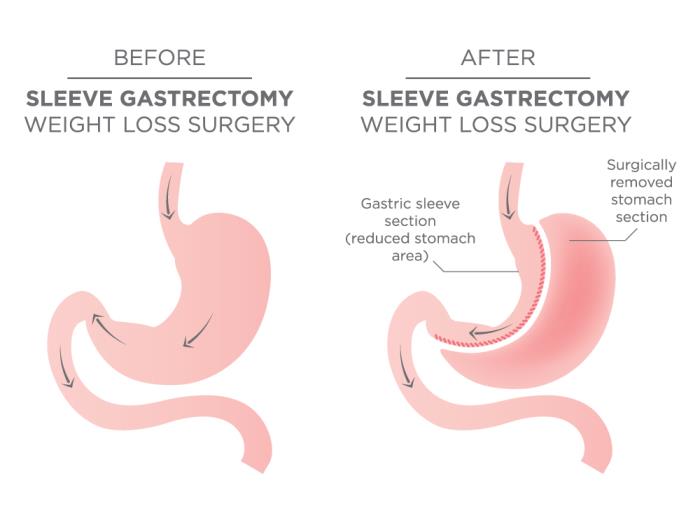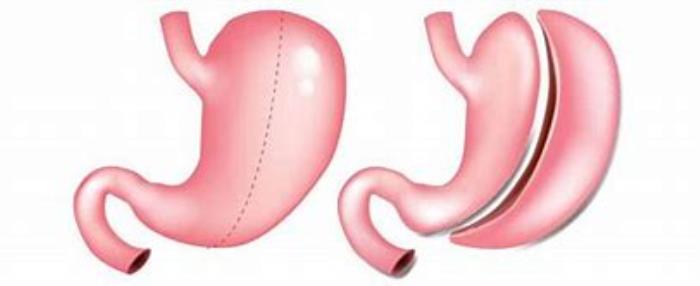Sleeve gastrectomy is a minimally invasive surgical procedure designed to treat obesity by removing a significant portion of the stomach. This procedure not only aids in weight loss but also helps alleviate various obesity-related health conditions, leading to improved overall health and quality of life.
As patients lose weight, they often experience a reduction in the severity of conditions such as diabetes, hypertension, and sleep apnea, making sleeve gastrectomy a critical option for those struggling with obesity.
What is Sleeve Gastrectomy?
Sleeve gastrectomy, also known as gastric sleeve surgery, involves the removal of about 80% of the stomach, resulting in a tubular, sleeve-like structure. This significantly limits food intake and reduces hunger-inducing hormones, aiding in weight loss.
The procedure is typically performed laparoscopically, allowing for quicker recovery times and less postoperative discomfort compared to traditional open surgeries.
How Does Sleeve Gastrectomy Aid in Weight Loss?
By reducing the stomach size, sleeve gastrectomy limits the amount of food a person can consume at one time, promoting feelings of fullness sooner. This restriction, combined with hormonal changes that decrease appetite, leads to significant weight loss over time.
Patients often report losing a substantial percentage of their excess weight within the first-year post-surgery, making it an effective long-term solution for obesity.

Benefits of Sleeve Gastrectomy for Obesity-Related Health Issues
Sleeve gastrectomy offers numerous health benefits beyond weight loss. Many patients experience improvements in obesity-related conditions, including type 2 diabetes, hypertension, and metabolic syndrome, often leading to a reduction or elimination of medications.
Sleeve Gastrectomy and Type 2 Diabetes Management
Research indicates that sleeve gastrectomy can lead to significant improvements in blood sugar control and may even induce remission in type 2 diabetes patients. The surgery reduces insulin resistance and improves the body’s ability to regulate blood glucose levels.
Impact of Sleeve Gastrectomy on Hypertension
Many individuals with obesity suffer from hypertension, which can lead to severe health complications. Sleeve gastrectomy can significantly lower blood pressure levels, as weight loss often correlates with reduced arterial strain and improved cardiovascular health.
Studies show that a considerable number of patients achieve normal blood pressure levels post-surgery, decreasing their reliance on antihypertensive medications.
How Sleeve Gastrectomy Helps Improve Sleep Apnea
Obstructive sleep apnea (OSA) is a common condition in individuals with obesity, often leading to disrupted sleep and serious health issues. Sleeve gastrectomy can lead to significant weight loss, which helps reduce the severity of sleep apnea symptoms.
Can Sleeve Gastrectomy Improve Joint Pain and Mobility?
Excess weight places significant strain on joints, often leading to pain and reduced mobility. Sleeve gastrectomy can help alleviate joint pain by promoting weight loss, which relieves pressure on weight-bearing joints.
Many patients experience improved mobility and a greater ability to engage in physical activities post-surgery, enhancing their quality of life.
Cardiovascular Health Benefits of Sleeve Gastrectomy
Sleeve gastrectomy has notable cardiovascular benefits, primarily through weight loss and its positive effects on blood pressure, cholesterol levels, and overall heart health. Reduced body weight lowers the risk of heart disease and improves circulation.
Patients often report enhanced energy levels and reduced fatigue, allowing them to participate in more physical activities that further benefit cardiovascular health.
Sleeve Gastrectomy for Reducing Risk of Stroke
By addressing risk factors such as obesity, hypertension, and diabetes, sleeve gastrectomy can significantly lower the risk of stroke. The procedure promotes weight loss, which in turn improves cardiovascular health and reduces the likelihood of stroke-related complications.

How Sleeve Gastrectomy Lowers the Risk of Heart Disease
The relationship between obesity and heart disease is well-documented, with excess weight contributing to various cardiovascular risk factors. Sleeve gastrectomy helps mitigate these risks by promoting substantial weight loss and improving overall metabolic health.
As patients lose weight and improve their cardiovascular metrics, they significantly decrease their chances of developing heart disease, leading to a healthier and more active lifestyle.
The Role of Sleeve Gastrectomy in Managing Cholesterol Levels
Sleeve gastrectomy plays a significant role in managing cholesterol levels by facilitating weight loss and improving metabolic health. As patients lose weight, they often experience reductions in LDL (bad cholesterol) and increases in HDL (good cholesterol), leading to a healthier lipid profile.
These changes can significantly lower the risk of cardiovascular diseases, as high cholesterol is a major contributing factor to heart-related health issues.
Can Sleeve Gastrectomy Help Reverse Metabolic Syndrome?
Yes, sleeve gastrectomy can help reverse metabolic syndrome, a cluster of conditions that increase the risk of heart disease, stroke, and diabetes. By promoting substantial weight loss, the procedure addresses key components of metabolic syndrome, including high blood pressure, abnormal cholesterol levels, and insulin resistance.
Patients often see significant improvements in their metabolic markers shortly after surgery, contributing to better overall health.
Long-Term Health Improvements After Sleeve Gastrectomy
Long-term health improvements following sleeve gastrectomy can be profound, extending well beyond weight loss. Many patients experience significant reductions in obesity-related health conditions, including type 2 diabetes, hypertension, and sleep apnea, often leading to improved quality of life.
Studies suggest that the benefits of sleeve gastrectomy can last for years, with many patients maintaining their weight loss and experiencing sustained health improvements.
Dietary Changes After Sleeve Gastrectomy for Optimal Health
Post-surgery, patients need to make dietary changes to ensure optimal health and weight loss. A balanced diet focusing on high-protein, low-carbohydrate foods is recommended to promote healing and support weight loss.
Regular follow-ups with a dietitian can help patients develop meal plans that incorporate essential nutrients while avoiding high-calorie and sugary foods, ensuring long-term success.
How Sleeve Gastrectomy Supports Sustainable Weight Loss
Sleeve gastrectomy supports sustainable weight loss by creating a smaller stomach that limits food intake and promotes feelings of fullness. This physical restriction, combined with hormonal changes that reduce hunger, helps patients make healthier food choices.
Moreover, the surgery encourages lifestyle modifications that can lead to lasting changes in eating habits and physical activity, further promoting weight maintenance.
Sleeve Gastrectomy and Mental Health: Reducing Obesity Stigma
The psychological benefits of sleeve gastrectomy can be significant, as many patients experience reduced stigma associated with obesity. By achieving weight loss and improving physical health, individuals often report enhanced self-esteem and body image.
These improvements can lead to better mental health outcomes, helping to combat issues such as depression and anxiety commonly faced by those with obesity.
Lifestyle Changes to Maximize the Benefits of Sleeve Gastrectomy
To maximize the benefits of sleeve gastrectomy, patients should commit to lifestyle changes that support their new health journey. This includes adopting a balanced diet, engaging in regular physical activity, and attending support groups to foster motivation and accountability.
Creating a supportive environment and surrounding oneself with encouraging individuals can further enhance the success of their weight loss journey.
Exercise and Physical Activity After Sleeve Gastrectomy
Incorporating exercise and physical activity post-sleeve gastrectomy is crucial for long-term weight maintenance and overall health. Patients are typically advised to start with low-impact activities, gradually increasing intensity as they regain strength and confidence.
Regular exercise not only aids in weight loss but also improves cardiovascular health, boosts mood, and enhances overall quality of life.
Potential Complications of Sleeve Gastrectomy for Health Conditions
While sleeve gastrectomy is generally safe, there are potential complications that patients should be aware of. These can include leaks from the stomach sleeve, strictures, and nutritional deficiencies due to reduced food intake.
Close monitoring and regular follow-ups with healthcare providers can help mitigate these risks and ensure patients receive the necessary support for a successful recovery.
Why Choose Sleeve Gastrectomy for Obesity-Related Conditions?
Sleeve gastrectomy is an effective choice for individuals struggling with obesity-related conditions due to its dual benefits of significant weight loss and improvement in related health issues. The procedure has shown high success rates in achieving long-term weight loss and remission of conditions such as diabetes and hypertension.
Patients often report a higher quality of life and improved health outcomes, making sleeve gastrectomy a viable option for those seeking lasting change.
Best Sleeve Gastrectomy Treatment in India
The Best Sleeve Gastrectomy Treatment in India is performed by expert surgeons who utilize advanced techniques to ensure optimal outcomes for patients, offering a personalized treatment plan tailored to individual health needs.
Best Sleeve Gastrectomy Hospitals in India
The Best Sleeve Gastrectomy Hospitals in India are equipped with cutting-edge technology and facilities, providing top-notch care, including pre-surgery consultations, surgical expertise, and post-operative recovery support to ensure a smooth patient journey.
Sleeve Gastrectomy Cost in India
When considering the Sleeve Gastrectomy Cost in India, patients benefit from affordable and transparent pricing at leading hospitals, which offer cost-effective treatment options without compromising the quality of care.
Best Sleeve Gastrectomy Doctors in India
The Best Sleeve Gastrectomy Doctors in India are highly experienced in performing the surgery, utilizing a patient-centric approach that ensures personalized care, precise surgical techniques, and dedicated follow-up care to enhance recovery.
FAQ for Sleeve Gastrectomy for Treating Obesity-Related Health Conditions:
How Long Does It Take to Recover from Sleeve Gastrectomy?
Recovery from sleeve gastrectomy typically takes about 4 to 6 weeks. Most patients are able to return to light activities within a week or two, but strenuous physical activity should be avoided until fully cleared by a doctor. Full recovery depends on individual healing and adherence to postoperative care instructions.
Will I Need to Follow a Special Diet After Sleeve Gastrectomy?
Yes, patients will need to follow a special diet after sleeve gastrectomy. Initially, you’ll start with liquids, then progress to pureed foods, soft foods, and eventually regular meals over several weeks. Long-term, a balanced, high-protein, low-sugar diet is essential for maintaining weight loss and overall health.
How Much Weight Can I Expect to Lose with Sleeve Gastrectomy?
Patients typically lose 60-70% of their excess weight within the first 12 to 18 months after sleeve gastrectomy. The exact amount of weight loss varies based on individual factors, such as adherence to dietary guidelines and lifestyle changes.
Is Sleeve Gastrectomy Safe for Patients with Severe Obesity-Related Health Conditions?
Yes, sleeve gastrectomy is considered safe for patients with severe obesity-related health conditions. In fact, it is often recommended for those who have not had success with other weight-loss methods and need to address issues like diabetes, hypertension, or sleep apnea. The procedure can improve or resolve many of these conditions.
Can Sleeve Gastrectomy Cure Type 2 Diabetes Permanently?
While sleeve gastrectomy can lead to significant improvements in Type 2 diabetes and, in some cases, remission, it is not guaranteed to be a permanent cure. Many patients see improved blood sugar control after surgery, but long-term management depends on weight maintenance and lifestyle choices.